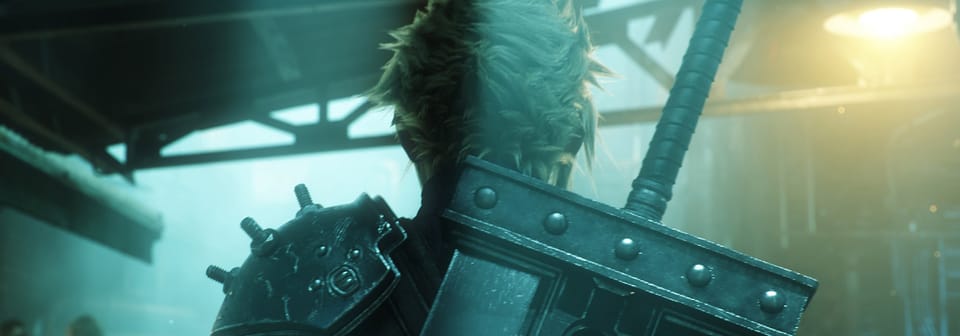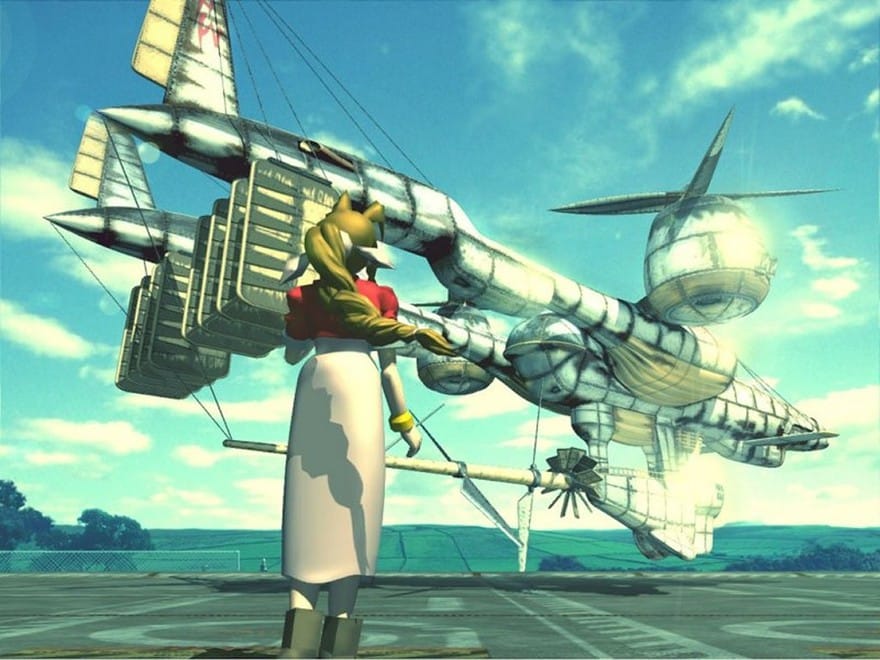Let the Nostalgia Die: C.S. Lewis and the Final Fantasy VII Remake

This article was written by Chris Casberg and originally published on Gamechurch.com.
It was brought to us by our friends at Critical Distance, who find the best in critical writing about games each week. You can see more at their site, and support them on Patreon.
///
Eighteen years ago, a young Minnesota farmboy picked up a magazine left behind by his older brother, and his life changed forever. The boy’s mother very much disliked what was in those magazines, preferring instead he pursue a healthier hobby outdoors—like shoveling manure from goat stalls, or grabbing a pitchfork and a garbage bag to hunt down a stray horse placenta in the pasture before it attracted wild dogs. But in those days young men always found their magazines, and they leafed through them whether their mother liked it or not. This young farmboy was no different, and the images he encountered in those multi-page spreads ravished his tender mind.
Or, to retell the story in the style of Joseph Heller’s novel, Catch-22: The first time Christopher saw Final Fantasy VII, he fell madly in love with it. He wasn’t alone. Final Fantasy VII, developed by the Japanese developer Square, hit American shores in late 1997. It was a runaway commercial and critical success, helped in no small part by the marketing blitz that included multi-page features in a variety of gaming magazines, mine included. VII was a technological marvel in an era when 3D was just stretching its legs, and its epic scope and dramatic story kept gamers talking for years. To this day, when older gamers list off their all-time favorite games, VII is often somewhere near the top. It was a landmark game, and it’s enshrined in the hearts of millions.
So when Square-Enix announced during this year’s E3 that, at long last, after years of speculation and hints they were giving Final Fantasy VII the full HD remake treatment, it’s no surprise the internet lost its collective mind. I mean, look at these dudes. I think they’re crying. One of them is so excited he’s trying to climb his chair to the moon.
I’ll admit it: the reveal trailer for the Final Fantasy VII remake may have summoned a tear or two to my eye. I’ve got a lot of good memories of the original game, and nigh two decades later it’s easily in my personal top ten list. In fact, I yearn for those same experiences the game gave me as a child. There is a subconscious wish in me that every game will be another Final Fantasy VII. I want today’s games to give me that same shock I felt the first time I arrived at the top of the Shinra Headquarters, that same sense of freedom and wonder I felt the first time I left the polluted metropolis of Midgar. I burn with nostalgia, and companies like Square-Enix are more than willing to accommodate me as long as I’m paying.
Nostalgia anchors us in an anachronism
Nostalgia’s a funny thing, though. Or perhaps it’s not funny—more likely it’s a trap. Nostalgia anchors us in an anachronism, keeping us tethered to old thoughts and feelings while time drifts ever onward. Neither those feelings from our youth nor our fond memories are bad in themselves, of course. It’s the wishing to be there again, to be a child in front of a bulging tube television crackling with static discharge while the Playstation’s chatty disc drive whirs and clicks, that leads us astray. The greatness of those past moments is particular to their time and place in the formation of our imagination. We can’t ever actually become a child in a particular development stage again, as much as we might wish Jesus’ command that we be like children mean that. To yearn for a return to that state is to yearn for retrogression, a diminishing of the person God is actively forming.
C.S. Lewis talks a bit about this trap in Mere Christianity. In the chapter on Christian marriage, Lewis asserts that marriage cannot depend on “being in love,” the thrilling tidal wave of emotion that accompanies attraction—or what one creepy old owl called being “twitterpated.” This initial thrill of “being in love” can never last. Either true love, that patient, self-giving project, drives the marriage onward, or it crumbles. The man or woman who jumps from marriage to marriage, hoping to maintain a feeling as ephemeral as a spring snowflake, will be forever disappointed.
He writes that other budding loves work much the same way. “In this department of life, as in every other, thrills come at the beginning and do not last. The sort of thrill a boy has at the first idea of flying will not go on when he has joined the R.A.F. and is really learning to fly. The thrill you feel on first seeing some delightful place dies away when you really go on to live there.”
If I may put it in more relevant terms, the thrill you feel the first time you fly the Highwind or breed a Gold Chocobo will not last on subsequent playthroughs.

As I’ve grown older, this is something I’ve noticed more and more. My enjoyment of a new game is rarely quite as high as the excitement I feel when I first come across the promotion materials. While games from my youth like Final Fantasy VII and Chrono Cross enraptured me from the moment I saw the first TV spot to the roll of the ending credits, today skepticism sets in almost immediately. Even when I stave off doubts and let a game speak for itself, I quickly find myself dissecting and critiquing its various elements almost automatically. Childlike enthusiasm, when it stirs at all, dies almost immediately.
This is not necessarily a bad thing. Lewis again: “This is, I think, one little part of what Christ meant by saying that a thing will not really live unless it first dies.” (Lewis here, I believe, is referring to Christ’s words from John 12:24. From the ESV: “Truly, truly, I say to you, unless a grain of wheat falls into the earth and dies, it remains alone; but if it dies, it bears much fruit.”) He continues, “Let the thrill go—let it die away—go on through that period of death into the quieter interest and happiness that follow—and you will find you are living in a world of new thrills all the time.”
This is sound wisdom for gamers: let the nostalgia die, and a greater, more permanent joy will take its place.
I’ve read a lot of skepticism about the Final Fantasy VII remake, and beyond some technical concerns the main fear is that the new edition will not capture the feeling of the old. Well, of course it won’t, unless you can fling yourself backwards in time into the person you were 18 years ago. Though the memories remain, the feelings from that period are long dead. Let them stay buried. It’s no use trying to revive those old thrills. Trying to do so is a trap. Lewis writes, “But if you decide to make thrills your regular diet and try to prolong them artificially, they will all get weaker and weaker, fewer and fewer, and you will be a bored, disillusioned old man for the rest of your life,” and he is right in my experience. My own attempts to revive the thrills of my earlier gaming years have always ended in disappointment.
Good thing, too. If I wasted all my time chasing that innocent but woefully shallow joy I first felt all those years ago, I would have never achieved the depth of affection and appreciation I have for video games today. So what if I am no longer overwhelmed by novelty? Who needs it! It is excellence of craft I desire, and nostalgia would but blind me to the incredible artistry of today’s video games. When we perpetually seek the good old days, we not only whitewash old flaws—playing Final Fantasy VII today is like getting a tooth pulled, by the way—but we also ignore the new gems before us. New games bring new mechanics and systems and stories that require an expansion of our mind to appreciate. One could say that as we age, our gaming palette is enriched. If you go out to McDonald’s and no other restaurant because you want to preserve your fond memories of getting a Happy Meal, you’ll miss out on good cuisine. Games are the same way.
One of them is so excited he’s trying to climb his chair to the moon
So what are we to do with the Final Fantasy VII remake? Nostalgia will compel many of us to open our wallets, but what are we to think when the game fires up? Square-Enix said they are rebuilding the game from the ground up, and there are multiple aspects of the original Final Fantasy VII that I foresee them discarding. There will almost certainly be the feeling, whether in the first hour or the tenth, “This isn’t what I remember, or what I hoped for.”
Let the feeling pass. Evaluate the new game on its own merits. Don’t get caught in the trap of fretting how you’re not feeling the way you felt the first time you laid eyes on a spiky-haired mercenary with a huge sword leaping off a train.
Lewis concludes his thoughts on the matter thus: “It is because so few people understand this that you find many middle-aged men and women maundering about their lost youth, at the very age when new horizons ought to be appearing and new doors opening all around them. It is much better fun to learn to swim than to go on endlessly (and hopelessly) trying to get back the feeling you had when you first went paddling as a boy.” Let’s take his advice and give up chasing those moments of our youth, instead embracing the mature and patient delight in games that come only when the flame of “being in love” has extinguished. When we do, our love of games—even a remake of a childhood favorite—will be all the richer for it.
///
This article was written by Chris Casberg and originally published on Gamechurch.com.
It was brought to us by our friends at Critical Distance, who find the best in critical writing about games each week. You can see more at their site, and support them on Patreon.



